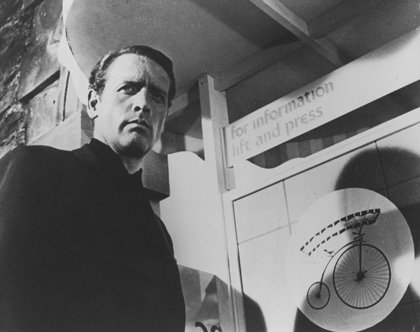Patrick McGoohan, actor

b. 19/3/1928; d. 13/1/2009
“What do you want?” asks Number Six. “Information,” says the big echoey disembodied voice. Number Six then utters heresy: “Well you won’t get it.” This exchange is the second best-remembered from Patrick McGoohan’s terrifically bonkers 1967-68 television series The Prisoner. The key catchphrase, declaimed in that slippery mid-Atlantic accent of McGoohan’s, was baby-boomer philosophy incarnate: “I am not a number, I am a free man.”
To watch McGoohan’s progress as a 1960s television star was an education in art practice. Having established himself in 1960 as a darkly handsome existential hero in Danger Man (1960-61), McGoohan turned down the roles of James Bond and The Saint, before returning when Danger Man was revived in 1964. He made it an unmissable show, but brought the fourth series to a abrupt halt when he’d had enough. TV impresario Lew Grade then asked him if there was something he’d rather do – and The Prisoner was one he’d prepared earlier.
At first quirkily surrealist in a manner established by increasingly adventurous series of The Avengers, The Prisoner portrayed a quasi-Cold War scenario of a British spy who quits and is dumped on what seems to be an island, told he is Number Six and given a room in ‘The Village’ (actually Portmeirion, that quaint collection of architectural pastiches in Wales). He is always trying to escape, getting captured by fast-moving and aggressive balloons, wrangling with Number Two and trying to find out who Number One is. McGoohan executive-produced the series, directed four episodes, and wrote six. The seven original episodes eventually became 17, and as it bowled towards its truly outlandish climax, it became an icon of its creatively permissive age. But it also became the albatross around McGoohan’s neck.
Born in New York but raised in Ireland and Sheffield, McGoohan graduated to acting from assistant stage-managing at the Sheffield Repertory Company, and got his breakthrough when he played a priest accused of being gay in the West End production of Serious Charge. Orson Welles saw the play, and cast him in his 1955 London stage production Moby Dick Rehearsed. Subsequently McGoohan was hampered by an unhappy period under contract to Rank, during which he played a number of scheming villains, not least the foreman ‘Red’ Redman in Hell Drivers (1957). It was only after that contract was dissolved that his television career began to take off.
But following the triumphs of Danger Man and The Prisoner, McGoohan’s subsequent career had a desultory look. He turned up in many a movie, notably Ice Station Zebra (1968), Silver Streak (1976), Escape from Alcatraz (1979) and David Cronenberg’s Scanners (1981). He also maintained an intermittent television career that included starring in the 1977 series Rafferty and directing five scattered episodes of Columbo between 1975 and 2000. He summed himself up ruefully: “Mel Gibson will always be Mad Max. I will always be a number.”
Nick James
